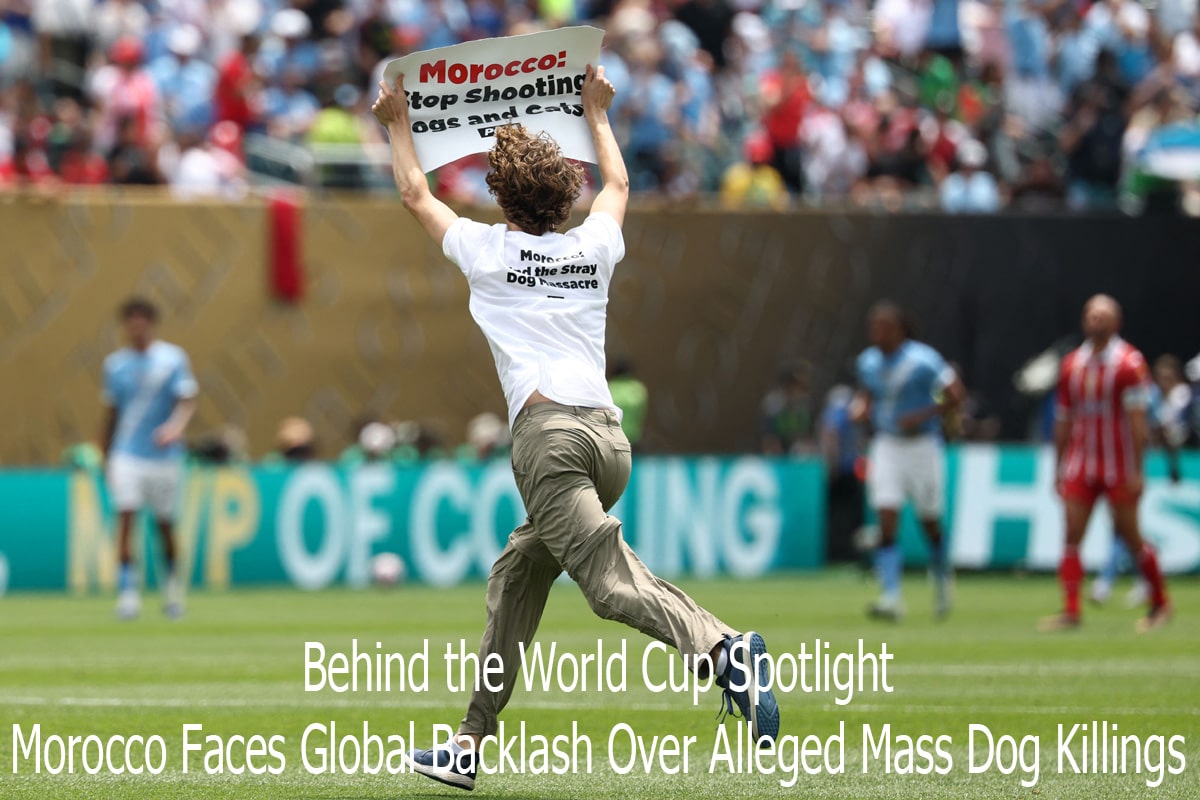Preparations are overshadowed by controversy as Morocco gets ready to co-host the 2030 FIFA World Cup with Portugal and Spain. International media and animal rights organizations have launched accusations that Morocco is mass-murdering stray dogs, possibly up to three million of them, in order to “beautify” urban areas for tourists and football fans.
These claims, while denied by Moroccan officials, have sparked international outrage and raised serious concerns about ethics, public image, and the responsibilities of a World Cup host nation.
Accusations of Brutality
The International Animal Welfare and Protection Coalition (IAWPC) has led the charge, accusing Moroccan authorities of violently exterminating stray dogs using strychnine—a poison known for causing agonizing deaths. Activists claim the animals have been rounded up, poisoned, shot, or captured with steel traps, with some left to suffer for hours before dying.
Photos and videos circulating on social media reportedly show injured dogs writhing in pain, dead bodies left in public spaces, and even children witnessing the killings. “This is not just an animal welfare issue—it’s a humanitarian one,” said one activist.
Renowned primatologist Jane Goodall has publicly condemned the killings, writing a formal letter to FIFA urging immediate intervention. “Many football fans are also animal lovers,” she warned. “What will they think when they find out about this cruelty?”
Global Response
The backlash has extended beyond animal rights circles. The Moroccan government and FIFA are being urged to stop the claimed effort by petitions signed by more than 60,000 people. Protest banners appeared during international football matches, including one in Philadelphia reading: “Morocco – Stop Shooting Dogs and Cats!”
Celebrities such as actor Ricky Gervais and Downton Abbey’s Peter Egan have spoken out. The message is clear: Morocco’s World Cup ambitions are now under the microscope, and not just for their stadium construction or team performance.
A More Complex Picture?
Despite the strong accusations, the situation on the ground appears more nuanced.
As reported by the Associated Press, Morocco has been implementing a Trap-Neuter-Vaccinate-Return (TVNR) program since 2019. With clinics established in cities like Rabat, Casablanca, and Marrakech, the initiative is designed to manage stray dog populations humanely—catching, sterilizing, vaccinating, and releasing them back to the streets.
Officials claim the TVNR program has received approximately $23 million in funding over five years, and that euthanasia is only performed using sodium pentobarbital on sick or aggressive animals. Morocco estimates its stray dog population to be between 1.2 and 1.5 million, far lower than the 3 million cited by activists.
“Not all dogs are killed,” said a government spokesperson. “We are working to balance public health, safety, and animal welfare.” The Moroccan government also firmly denies that the killings are part of World Cup preparations.
Trust and Transparency in Question
Activists dispute these official narratives, insisting that mass killings have intensified since Morocco was named co-host in 2023. They argue that the TVNR program is underfunded and inconsistently applied, citing unverified videos and testimonials from local residents.
International media coverage, mostly from outside Morocco, has contributed to a polarized view of the issue. With few independent journalists on the ground, verifying details has proven difficult. Nonetheless, the emotional weight of the story—dead dogs, poisoned streets, traumatized communities—continues to fuel public concern.
What Does FIFA Say?
So far, FIFA has remained silent. The organization has yet to issue a formal response despite mounting petitions and public pressure. Critics argue that, as the governing body of the tournament, FIFA has a moral responsibility to ensure host countries meet not only infrastructure and security standards but also ethical and humanitarian expectations.
“FIFA can no longer ignore these allegations,” said one spokesperson for In Defense of Animals. “They must investigate or risk tainting the legacy of the 2030 World Cup.”
Seeking Humane Alternatives
Veterinarians and animal welfare experts are urging Morocco to expand its TVNR program and consider community-based adoption models. Examples from countries like Indonesia and India have shown that non-lethal population control can be effective when supported by public education, vaccination, and proper funding.
“Mass killings don’t make a city safer,” said one Rabat-based vet involved in the TVNR initiative. “A healthy, managed stray population is the key to peaceful coexistence.”
A Test of Morocco’s Image—and FIFA’s Integrity
The world is keeping an eye on Morocco’s stadiums, training grounds, streets, and animal shelters as 2030 approaches. The controversy highlights the intersection of sports, tourism, and ethics in the modern age.
Whether Morocco chooses to address the issue transparently, and whether FIFA responds meaningfully, will shape not only the fate of thousands of animals but the reputation of the tournament itself.

